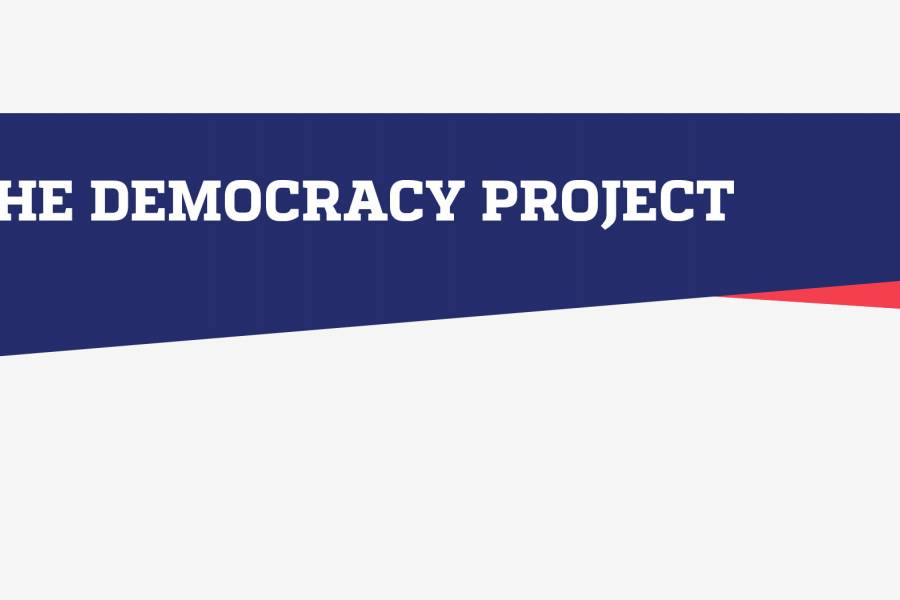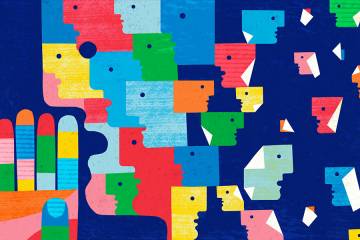
Image caption:Robert C. Lieberman is Krieger-Eisenhower Professor of Political Science at Johns Hopkins University. He studies American political development, race and American politics, and public policy. He has also written extensively about the development of American democracy and the links between American and comparative politics.
Image credit: Will Kirk / Johns Hopkins University
The state of U.S. politics today leads many to gloom, but some take heart that our system of government and democracy itself are invulnerable. Not so. U.S. democracy has been in peril before, and, as is often the case, history repeats itself.
In Four Threats: The Recurring Crises of American Democracy (Macmillan, 2020), Robert C. Lieberman, a professor of political science at Johns Hopkins, and Suzanne Mettler, a professor of American institutions at Cornell University, explore five moments in history when democracy in the United States was under siege: the 1790s, the Civil War, the Gilded Age, the Great Depression, and Watergate. While each moment threatened the survival of the republic, our democratic experiment survived. We spoke with Lieberman about the threats currently converging in the United States.
Your book tells the stories of fragile moments in our history. This isn't the first time that U.S. democracy has come under threat, and it won't be the last.
Democracy is not an on/off switch, a case of either you are a democracy or you aren't. It's a continuum. The United States started out as a pretty constrained, limited democracy. Citizenship was limited to white men, and it was only over centuries of politics and struggle that the boundaries of who counts as a full citizen have been expanded.
Scholars of American politics and, I think, citizens in general tend to think of the United States as existentially a democracy, that it always has been and always will be. But there's no reason to assume that the United States is immune to the things that in other countries can erode and degrade this form of government.
The question at any one time is not whether we are a democracy but in which direction are we headed. Are we moving forward or are we moving backward?
You identify four threats that pose challenges to the sustainability of democracy, and one is political polarization, which there is no shortage of at this moment.
Yes. It's this Us versus Them dynamic. We're divided into camps or teams. A second threat is conflict over the boundaries of who belongs in the political community, and in the United States that typically expresses itself through racism or nativism, or conflict over racial lines. A third is high and rising economic inequality. And a fourth threat is growing executive power at the expense of the other branches.
When we look at periods of democratic fragility in the past, we see that they all feature some combination of these four threats. In the 1790s, there was a period of intense polarization between Federalists and Republicans. The 1930s and the 1970s were eras of rising executive power. Presidents started to use the tools of the presidency as a political weapon. We had two periods in the 19th century, right before the Civil War and in the 1890s, when multiple threats were present in polarization, racial conflict, and economic inequality. These two periods led to really cataclysmic challenges for democracy in the middle of the century, the Civil War and, in the 1890s, the mass disenfranchisement of African American men in the South.
All of that is leading up to my saying that now is the first time that we can identify in American history when all four of these threats are present at the same time. I think there's an argument to be made that this is an extremely pressing and deep crisis for American democracy. That clearly is my greatest fear.
The book talks about what is needed for a thriving, healthy democracy. And here, too, we're seeing stark warning signs.
One is free and fair elections. Is the system able to conduct free and fair elections that can actually have a decisive result? Second is the rule of law. Does the law apply equally to everybody, and are there ways in which people in power can avoid obeying the law? The third is the idea of legitimate opposition. Can you and I be opponents or disagree without this becoming an existential conflict, or without us being enemies who have to vanquish each other? And finally, we talk about the integrity of rights. Does the system protect the basic rights that are necessary to make democracy work? I'm talking free speech, assembly, protest, civil rights, equality under law, and so on and so forth. And if you look at those things, I think they're all under threat right now.
When I think of a free and fair election, what comes to mind is voter suppression, whatever form that might take. One side makes it more difficult for a group to be counted.
Voter suppression is at the center of the challenge to free and fair elections right now. This isn't the first time we've seen this. In the 1850s, and we write about this in the book, Kansas was the epicenter of an electoral crisis and violent conflict over slavery. Kansas was a new territory—it wasn't even a state yet—and you had a series of elections that were marred by all kinds of fraud and voter suppression. There were roving bands of free state and pro-slavery militias wandering around the territory, trying to intimidate the other side every time there was an election. In 1898 in North Carolina, there was an election that pitted white supremacist Democrats against a fusion ticket of Republicans and Populists that was a biracial coalition. This election was marred by attempts at voter suppression through violence and was followed in Wilmington basically by a coup d'état, where white supremacist militias ousted the legitimately elected government of the city.
Voter suppression has taken many forms in American history. There has been a concerted effort now for several years, going back to the hollowing out of the Voting Rights Act by the Supreme Court in 2013, which gave states a much freer hand to change the rules about how people vote. That's how in Georgia, for example, they're allowed to cut the number of polling places or move polling places or impose restrictive rules on voting that make it harder for certain people to vote.
Do democracies die overnight, with a single personality or an event, or is it always this kind of erosion where a group takes advantage of weak spots that have built up over time?
Democracies don't typically die by people taking to the streets anymore. We have this picture of a coup in our mind, where the military throws the president out and takes over the radio stations, the airport, and then announces that they're in control.
In recent decades, democracies are much more likely to erode from the inside, in a situation where an elected leader takes advantage of the levers of power to sort of burrow into the government and change the rules, as Daniel Ziblatt and Steve Levitsky say in their book How Democracies Die. You see this in Turkey, and Hungary, and Venezuela, and countries that were nominally democracies, and where these democratically elected leaders have used their position of power to gradually capture control of the government. They've tilted the playing field so that it becomes harder in the next election for the legitimate opposition to throw them out.
You talk in the book about "backsliding," and that we're not always moving forward to this better, greater democracy where everyone is involved. For example, voter rights can slip away. But I'm looking for a ray of hope from you. What makes things bounce back the other way?
One of the core challenges of American democracy over the centuries has been building a true multiracial democracy. I think that the big challenge for American democracy is how to build a system that's really and truly inclusive in a way that it's never quite achieved before. I would say that the one thing that gives me a little bit of hope this summer is the Black Lives Matter protests that have emerged around the country since the George Floyd killing in Minneapolis.
The extent of those protests, and the wide embrace of them, shows me that people more than ever before are aware of the systemic racism that's held American democracy back and seem willing to address it in some way. I think that'll be a long process, and there'll be conflict and politics over it. But if there's a place to find a little bit of hope, it's that.
One of the things that Americans agree about, across lines of party or region or anything else, is that we essentially believe in democracy and democratic values. I think we need to prioritize democracy more. I hope that one of the things that comes out of this moment, this era of crisis, is a little bit more attention to democracy as a value in and of itself.
About The Democracy Project
The future of democracy as a system of government is increasingly uncertain. With a rise of populist forces globally and many existing democracies in regression, liberty itself seems under assault. In the United States, a diminished or warped democracy could have far-reaching repercussions for voting rights, the rule of law, education, the application of science, immigration, citizenship, and long-held societal norms we take for granted.
As we near an election in which many of the defining principles of democracy seem to hang in the balance, an array of Johns Hopkins experts will share their greatest hopes, their deepest fears, and their informed insights on the state of America's democratic experiment. Read more from The Democracy Project









